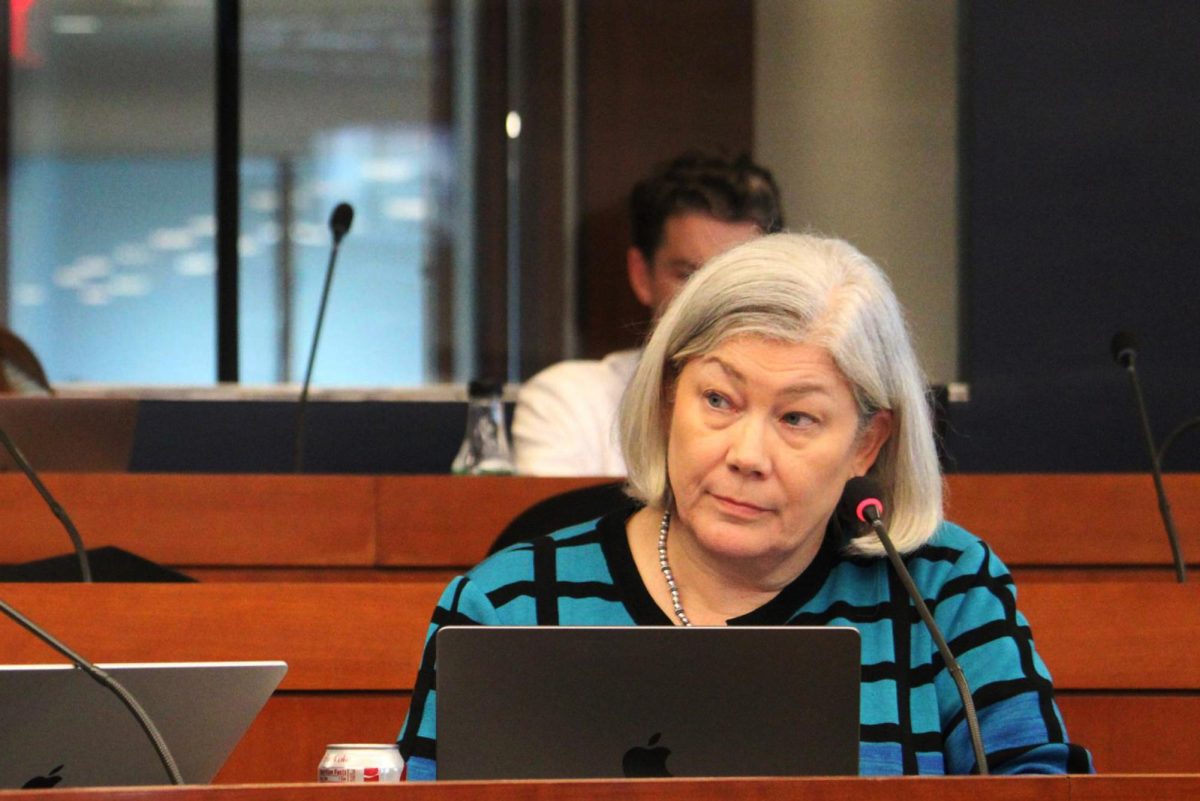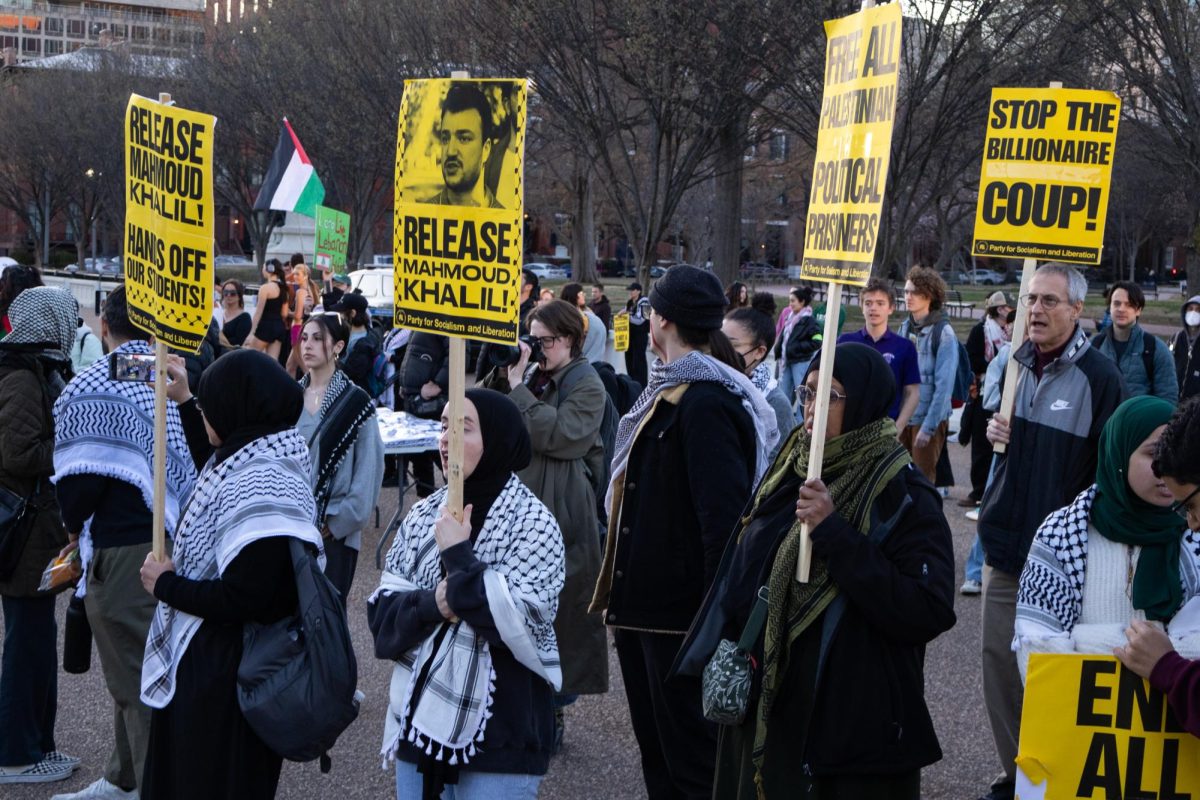Faculty senators criticized officials’ lack of faculty involvement in their decision-making about GW’s pro-Palestinian encampment at a meeting Friday.
Senators said officials could better communicate with and use faculty as a resource for key decisions at a Faculty Senate meeting Friday, three days after local police cleared the pro-Palestinian encampment in University Yard and arrested more than 30 demonstrators. Senators said they could have advised the administration on their handling of the encampment given professors’ relationships with students and expertise in related fields of study like communications and conflict management.
Faculty Senate Executive Committee Chair Ilana Feldman said the committee convened for an emergency meeting on the first day of the encampment and sent a letter to University President Ellen Granberg and Provost Chris Bracey that urged for a “de-escalatory approach.” She said the letter also states that senators were willing to help officials communicate with student protesters.
Sarah Wagner, a faculty senator and professor of anthropology, said communication from the administration has been “scant,” and she gets more texts from emergency alerts than emails from the offices of the provost or president. She said she imagined that “a lot” of faculty were also unaware of how officials were planning to respond to the encampment.
“That has to change as we move forward,” Wagner said.
In response to faculty’s questions, Granberg said she expected conversations with demonstrators to continue virtually throughout the summer to help foster dialogue around how the community can come together for the fall semester. She also claimed that “well over” half of people at the encampment were not GW students, so administrators did not consider the demonstration a student protest, which influenced their decisions about the encampment.
Jennifer Brinkerhoff, a faculty senator and a professor of public administration and international affairs, shared a written message from a faculty member in the Elliott School of International Affairs who said they were disappointed GW did not use the encampment as an opportunity to “create a space” for education and learning around “contentious and difficult” issues.
Brinkerhoff added that it was clear from the Elliott faculty meeting Friday morning that the community is “hurting,” given that there are faculty and students on different sides of a “very complex” international issue.
“As a University, as a place of higher learning, as a place that is trying to contribute to society, we have to model how we can hold that complexity and hold that compassion for all parties,” Brinkerhoff said.
Discussions about strengthening shared governance — the participation of faculty, students and staff in decision-making — have dominated Faculty Senate conversations following the departure of former University President Thomas LeBlanc and have continued since after the University made the decision to arm some GWPD officers last April. Senators argued the decision was a violation of GW’s shared governance principles, which state that all faculty have a role in “key decision making.”
Faculty senators also raised concerns about the large American flag that administrators draped over Lisner Hall last Friday after demonstrators removed a GW flag from the flagpole and replaced it with a Palestinian flag. Officials had taken down the flag by midday Sunday, but The Hatchet was unable to verify what time the flag was removed.
“I’m gonna echo my concern there because that feels like that was not responsive to students but to outside audiences,” Wagner said. “I just wonder if that was right in the moment. It feels like that may have been more escalatory than otherwise.”
David Rain, a faculty senator and a professor of geography and international affairs, said the timing of the University’s placement of the flag during a protest seemed “deliberately provocative.” Brinkerhoff said there “may be context” for the flag’s placement, but its presence has received national attention from across the U.S. and become a “soundbite” that implies student protesters are anti-American.
“That sends such a horrible message, so I really would urge you to refly the flags where they belong,” Brinkerhoff said.
Seven pro-Palestinian student organization representatives met with Granberg, Bracey, Chief Financial Officer Bruno Fernandes and Dean of Students Colette Coleman on Friday to discuss “broad community concerns” like free speech and Islamophobia on campus. In the email inviting representatives to the meeting, officials clarified that the University will not consider changes to its endowment investment strategy, academic partnerships or student conduct processes.
Feldman said she is concerned that GW’s meeting invitation stated they would not consider divestment, closing a door for negotiation between the two parties.
“Do not foreclose, before the meeting, the topics they are allowed to bring your sustained and serious attention,” Feldman said. “I think that this will create a better environment for moving forward and moving to a different place.”
Granberg said she did not intend for the statement to be “disingenuous” by leading students into a conversation where they would not meet all their requests. She said she is still open to engaging with students and asking them questions about their demands although the University will not be considering changes to those items.
Philip Wirtz, a faculty senator and professor of decision sciences and psychological and brain sciences, also pushed Bracey to meet a June 1 deadline on when faculty can expect progress from officials on an initiative pushing faculty salary equity, which he said professors have been waiting on for more than two years. Bracey was originally hesitant to meet the deadline, stating they would do so at their “earliest convenience,” but then said Vice Provost for Faculty Affairs Rumana Riffat would reach out to former committee members and potential new members by June 1.
Senators approved a resolution adding information on the role of faculty in the presidential search process after passing a resolution at the April meeting that did not explicitly mention faculty’s involvement. Guillermo Orti, the co-chair of the senate’s Professional Ethics and Academic Freedom Committee and a professor of biology, said the passage of the new resolution will mean the Faculty Assembly will elect a Faculty Consultative Committee to advise and consult with the Board of Trustees in the selection of any future University presidents.
Senators unanimously reelected faculty senators Ilana Feldman and Sarah Binder as the Executive Committee chair and senate parliamentarian, retrospectively.





